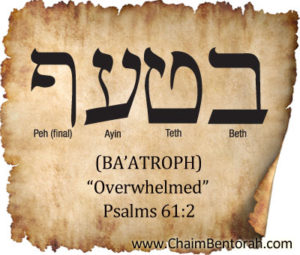HEBREW WORD STUDY – OVERWHELMED – BA’ATROPH בעטף Beth Ayin Teth Final Pei
Psalm 61:2: “From the end of the earth will I cry unto thee, when my heart is overwhelmed: lead me to the rock [that] is higher than I.”
 I read in the Sefer HaMaamarim (Book of the Discourses) used by Chasidic Jews that this verse shows the longing of David to break free from this physical world. The end of the earth is really an expression of our separation from God. In the physical realm, the end of the earth expresses the limit that we can experience God in the natural world. To draw any closer to God we would have to leave our physical bodies, ie., die. So David is either at death’s door calling out to God because his heart is overwhelmed or he is desperately longing to leave this old world behind and be joined with the God he so loves. The commentary by the Jewish orthodox scholar David Metzudat (found in the Sefaria app for those who are members of our All Access) tells us that David is consumed with a desire to flee the world and bond with God because his heart is overwhelmed.
I read in the Sefer HaMaamarim (Book of the Discourses) used by Chasidic Jews that this verse shows the longing of David to break free from this physical world. The end of the earth is really an expression of our separation from God. In the physical realm, the end of the earth expresses the limit that we can experience God in the natural world. To draw any closer to God we would have to leave our physical bodies, ie., die. So David is either at death’s door calling out to God because his heart is overwhelmed or he is desperately longing to leave this old world behind and be joined with the God he so loves. The commentary by the Jewish orthodox scholar David Metzudat (found in the Sefaria app for those who are members of our All Access) tells us that David is consumed with a desire to flee the world and bond with God because his heart is overwhelmed.
The word overwhelmed is ba’atop. Radak (David Kimhi, Jewish philosopher and Hebrew grammarian) translates the word ba’atoph as cloaked in trouble. The word comes from the root word ‘ataph which means to become so feeble that you begin to faint. In its Semitic origins, it means to be shrouded in darkness. In other words, David is just completely overburdened by troubles and distress. Are you ever so overburdened with the cares of this world that sometimes you feel like Elijah who cried out in 1 Kings 19:4: “…It is enough; now, O LORD, take away my life; for I [am] not better than my fathers.” That is what ba’atop means.
You can get as close to God as you can in this physical world, yet you can still feel like David and Elijah, ba’atroph, overwhelmed. Well, David realized dying just wasn’t an option so he said; “…lead me to the rock [that] is higher than I.” Here is where I part company with the Jewish teachings who teach that David is pictured as a Jew in exile longing to return to the Land of Israel. Perhaps that is true, but for us Christians, I think it is more.
The word rock is betsur. That Beth is a preposition in or on, David is not asking to be led to the rock but in the rock. The word for rock tsur has a wide range of meanings which expresses the idea of something or someone that is so strong it cannot be beaten. In the Akkadian, it is used to show the picture of a warrior who has conquered his foe by putting his foot on the back of his foe’s neck and pinning him to the group making him helpless. The foe is at the total mercy of the warrior who can dispatch him or force him into bondage. This would be a tsur who is higher than his opponent. The word higher is rum which means to lift up or exalt. The warrior is exalted over his opponent, he is mightier than his opponent, or higher than his opponent.
We assume that David is asking to be lifted up to the top of a cliff (another word for tsur) or a rock that his higher than he is. But that doesn’t make much sense, to be higher than he is you would just need a seven-foot-high rock, what good would that do him? I believe Paul was referring to this in I Corinthians 10:4 “And did all drink the same spiritual drink: for they drank of that spiritual Rock that followed them: and that Rock was Christ.” Jesus is our rock. He is that warrior that we place ourselves under that ultimate submission. Such submission that He can do whatever He likes with us.
David not only longed to be with God, but he knew he must remain on earth to fulfill a mission. However, if a mission he must fulfill, he wants to in a rock higher than himself, that is submitted to a warrior more powerful than himself, that warrior is God.
Troubles may and will come to us. Now is the time to prepare for that day by submitting to the tsur, Our Rock that is higher than us or the ultimate submission.







Yes